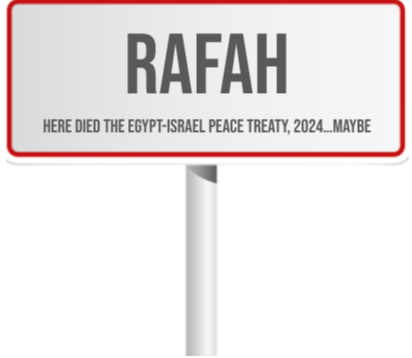
Benjamin Netanyahu, Prime Minister of Israel, announced on Feb. 11 that the Israeli Defense Forces were planning to invade the Gazan city of Rafah. The exact date of this operation remains to be seen, as Israel’s army formulates a plan by which to evacuate civilians before entering the city in an attack on Hamas.
The announcement comes after Rafah has already been the recipient of bombing by Israeli forces. 97 people are known to have died as a result.
This latest news from the war on Gaza has taken a toll on many–including Niles North students.
“I hate how desensitized I’ve become to such horrific things, but that’s unfortunately the reality,” Junior and MENA Club member Asmaa Khan said, regarding the bombing in Rafah. “When everyone around me is moving on with their life as if nothing has happened, I don’t know whether to let myself continue to feel this grief or to somehow move on with my day.”
Various concerns have emerged in the wake of Netanyahu’s announcement. The US State Department has stated its wariness of entering Rafah, given the size of the city’s population–over one million people, many of them refugees from areas which the Israeli Defense Forces have already entered. The United Nations seems to share the State Department’s concerns, voicing rejection of a “‘forced mass displacement.’” The city’s residents themselves have expressed fear at having to leave, whether it be out of wanting to hold onto resources, uncertainty as to where else to go, or simply from a weariness of moving from place to place. (Sources interviewed by Reuters floated ideas like checking those traveling to the North of Gaza to rule out Hamas membership, before allowing them to continue.)
An anonymous member of Jewish Student Association was speaking of tactics used by the Israeli Defense Forces to warn civilians of impending attacks.
“I have full confidence that the IDF will civilly evacuate the Palestinian population [in Rafah] how they normally do, with leaf notes, with generalized announcements, and with calling, multiple hours before, multiple days before,” the anonymous member said.
Israeli leadership, including Netanyahu, have stood fast in their decision, and they enjoy support from many.
“As an Israeli Jew with a brother (Niles North Alumni) currently serving in the IDF, I comprehend the challenges he faces and the efforts of the Israeli military to restore peace in the Middle East,” senior and Israeli Club member Gahl Yitzhak said. “It’s disheartening to see misleading information about Israel and the IDF on social media, especially when our collective goal is lasting peace.
Perhaps most pressing, however, are the concerns raised by the government of Egypt, on whose border Rafah is situated. In the event of an invasion, Egypt would be where many of the displaced would quickly turn to for sanctuary–if the country had not refused to take them in. Egypt’s government has given multiple reasonings for this closed-door policy: for one, it says, taking on as immense a number of refugees as would likely be produced by the invasion could harm the eventual goal of creating an independent nation for Palestinians, the population that resides in the Gaza Strip (including Rafah.) For another, they fear that Hamas could use the invasion and resulting flood of human beings as a way to enter Egypt and attempt to spread their message–a radical one that Egypt has already vigorously sought to extinguish within its borders.
In compliance with this policy, Egypt has tightened security on its border with Gaza. More worryingly, however, members of its government have also declared that, if Gazans were forced to attempt to enter Egypt as a result of the invasion, the country would cease to abide by the 1979 peace treaty between Egypt and Israel. Such a step would turn back the clock on the entire pursuit of peace in the Middle East.
The 1979 treaty has its roots in the Camp David Accords, an agreement between Israel and Egypt made the previous year, negotiated by then-US President Jimmy Carter. In the document, Egypt and Israel agreed to sign a treaty with each other, within three months. Up to then, Egypt had been arguably one of Israel’s foremost opponents, having been involved in every war against it since 1948, when Israel was attacked by Egypt and five other countries not long after declaring independence.
The creation of the Accords was no easy process. The Israeli, Egyptian, and American teams spent a total of 13 days at Camp David, going through twenty-three different drafts; twice, negotiations almost failed. Even afterwards, Carter had to personally visit Israel’s Prime Minister Menachem Begin and Egypt’s President Anwar Sadat, to convince them to accept the terms of the peace treaty they had already agreed to make. Nevertheless, the agreement was ultimately signed, and through it, Egypt and Israel have even collaborated in the past on efforts to fight Islamic fanatics.
The 1979 treaty stands out as not only the first major step toward an end to the Middle East conflict, but also as one of the only successful ones. Since its creation, the only similar agreement to be born is the Abraham Accords (created in part by then-President Donald Trump and his secretary of state, Jared Kushner), which in 2020 established peaceful relations between Israel and the countries of Bahrain, the United Arab Emirates, Morocco, and Sudan. In the interval between 1979 and 2020, every other proposed peace agreement has ultimately failed.
Now, with Egypt’s government threatening the fruits of Camp David, and Israel’s government resolute in their decision to move into Rafah, the Abraham Accords may become the last vestige of progress towards a peaceful Middle East.








